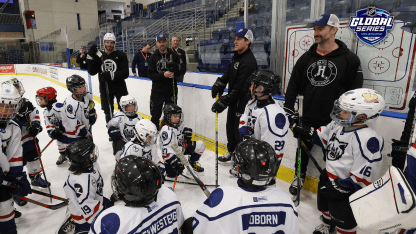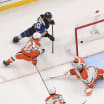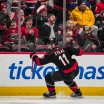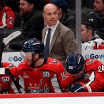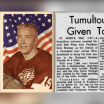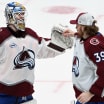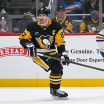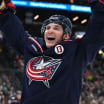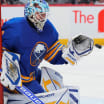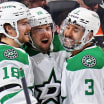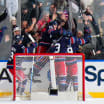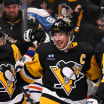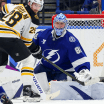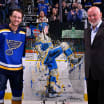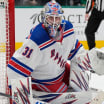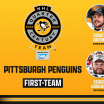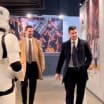MELBOURNE, Australia -- The doors opened and in walked Paul MacLean, his hands clutching the Stanley Cup. The room full of coaches looked on in awe, applause spilling out when MacLean lifted the Cup and they gathered around.
It was the culmination of a day of hockey talk for a group of Australia-based coaches gathered at Torrens University on Thursday for the NHL/Ice Hockey Association/NHL Coaches' Association Coaching Clinic featuring MacLean and Dallas Eakins.
The NHL has conducted such clinics around the world as part of the NHL Global Series, this time coming to Sydney and Melbourne for the 2023 NHL Global Series between the Arizona Coyotes and Los Angeles Kings at Rod Laver Arena. The games are Saturday and Sunday at 12 a.m. ET and will be available on NHL Network and ESPN+ in the United States, Sportsnet and Sportsnet+ in Canada, and 9Go, 9Now, ESPN and the ESPN App in Australia.
The day also featured NHL vice president of officiating Don VanMassenhoven and NHL referees Ghislain Hebert and Kevin Pollock and linespersons Matt MacPherson and Bevan Mills conducting an officiating workshop for Australian officials.
It was all about learning and growing the hockey knowledge among a "small but passionate" community, said Remi Harvey, coach of the Australia women's Under-18 team and the youth Olympics national team, among other coaching positions. Harvey has been playing hockey for almost 25 years, with Sunday afternoons growing up featuring trips to the local rink. Though her family expected they'd get a figure skater, she "saw a hockey game and the rest is history."
Harvey most appreciated the different angles taken by MacLean and Eakins.
"For me, I'm always looking on how I can build a better team culture and to build that relationship with players," Harvey said. "I identified with a lot of what Dallas was saying. And it was so nice, in contrast to that really getting into the nitty gritty, learning all about different face-offs and how a professional NHL coach sees that.
"It was great for me to just sit and listen."
For Brent Laver, an assistant coach of Melbourne in the Australian Ice Hockey League for the past 10 years, it was surreal to see MacLean and Eakins talking to a hockey community he has championed for years.
"Any opportunity to just listen and learn and just absorb, really, it's just an opportunity you can't let go by," Laver said.
He appreciated their ability to take complicated concepts and simplify them, making them accessible for coaches of youth teams all the way up to semipro and pro teams. The coaches were happy to impart their message and work to grow the game, especially in Australia where hockey remains under the radar.
"The biggest thing is to try to help these coaches help their players," MacLean said. "They're a developing nation in the game and it's not the No. 1 game that's played around here. We know that their resources are limited. We're trying to come here to give them maybe a little bit of technical help as far as making their practices better and more efficient, helping them understand the ice hockey game a little bit better."
There were about 75 people at the coaching symposium with a healthy dose of women.
"Inspiring, so inspiring," Eakins said. "The amount of desire and drive, passion, of these coaches to push forward a sport that isn't really a huge one here in this country and all driven to make the sport better and most importantly, to make the kids better that really love the game."
He said his biggest message at the clinic was "keep going."
"I think the easy thing to do when things get tough -- and there are challenges -- is to duck out and to quit," Eakins said. "I think they're doing a fabulous job. There's a lot of care here. I come from a real players-first mindset and the one thing that really resonated with me from these coaches and the people that are in hockey here in Australia is they've taken a real players-first attitude, a real kids-first attitude and a real sports-first attitude toward the game."
MacLean was impressed at the level of knowledge at the clinic, which included everyone from native Australians to Canadian ex-pats.
"Their passion for the game is what you notice the most," MacLean said. "The people that are here are very passionate for it. Nobody's making any money coaching hockey over here."
